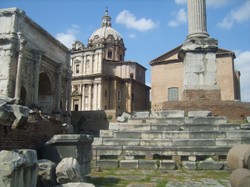Under the name of religious liberty I include not only the freedom of religious people to live by their principles, but the freedom of non-religious people to do the same. As a committed Christian I cherish the liberty to live by the beliefs and values that I hold dear, but I also want non-believers to have the same liberty that I do. Religious liberty is not only freedom to worship, but freedom to not only hold, but also to proclaim your beliefs and to put them into practice in the public arena.

Religious Liberty: a freedom under threat
by frankbeswick
Liberty is a precious gift that gives us ownership of our actions, and of all aspects of liberty religious liberty is most vital.
Freedom of conscience
Some of you readers may be surprised that while I am a committed Christian, a political philosopher whom I greatly admire was an atheist. John Stuart Mill was a man who was committed to maximizing the liberty of all people and respecting the individual's freedom to live by his/her beliefs/conscience and to express these views in public speech. I say his/her advisedly, as he was an early supporter of female liberties. I believe that Mill had it right when he declared that everyone is entitled to maximum liberty consistent with equivalent liberty for others. For Mill, the only reason for interfering with the liberty of any person was to prevent harm to others.
Of critical importance was his observation that offence is not harm. If someone expressed a view that offended Mill he would not have claimed to be excessively sensitive and hurt, he believed in arguing his case against it. Suppressing the expression of views was not Mill's way. He would not have argued for "no-platforming" but wanted to get all cases into the public arena and discussed, as he believed that untruth and irrationality were best combated by truth and rationality .
You see that Mill would have been no friend of political correctness,which is proving a tool by which left wing secularists put pressure on religious believers and which is becoming a form of anti-religious persecution.Claiming to be offended by someone's views was for Mill no reason to suppress them. "Argue your case" he would have declared.
Currently religious liberty is under threat in the world. In Saudi Arabia there never has been religious liberty and its government glories in the fact, as it does not believe in religious liberty. There is persecution of Christians in Muslim states, mainly by extremists and mobs rather than governments. But Muslims are persecuted too, for ISIS has killed more Muslims who disagree with it than it has killed Christians. The Yazidis, a minority faith in Iraq, suffer the horrors of persecution, with their men killed and their womenfolk enslaved. India's government is inspired by the Hindutva movement, which defines Indian identity in terms of allegiance to Hindusim and which has been making life difficult for Christians and Muslims. Various Indian states have banned conversion from Hinduism to other faiths and the government has prohibited a Christian charity from receiving foreign funding. Certain Communist states, such as North Korea repress religious belief or impose restrictions on believers. In Western countries religious liberty is protected by law, but there are elements who resent the liberties of those who disagree with them and try to stifle the expression of religious views. It is widely said that the last acceptable prejudice, as if any prejudice were acceptable, is anti-Catholicism. Mill did not agree with the Catholic Cardinal Manning, but he never wanted him banned from speaking and simply argued against his case against the cardinal.
The importance of religious liberty.
The Existentialists were a school of philosophers who were rooted in France, and a concept central to Existential philosophy is that humans need to live an authentic life. What does this mean? Take an example. Suppose that someone disbelieves in God, but realizes that expressing belief in a religion is economically and socially advantageous to him, so he feigns belief, he might become rich, but he is doing so by living an inauthentic life, living a lie, and not being true to himself. On the other hand, martyrs stay true to themselves by publicly living according to their beliefs and declaring them, even to the point of suffering, sacrifice and death. This is the ultimate act of authenticity.
Authenticity and human dignity are inseparable. How true you are to what you believe is essential to having a sense of worth. Being forced to conceal your beliefs and/or being denied the opportunity to give them expression is being denied something very precious, for it denies you the dignity that comes from living an authentic life, denying what makes life worthwhile.
At the very heart of our lives is our our status as persons, which gives us our unique individual value. At the core of personhood is our being moral individuals, people capable of thinking and holding ethical beliefs and commitments and living by them. Our being able to hold beliefs and act on them is not a luxury,it is so fundamental that it outranks all other values. So fundamental is it that people who take their beliefs and commitments seriously are prepared to fight and die for them rather than betray them.
There are two main problems facing freedom of religion. Values form part of a hierarchy of value, some of which are higher in importance than others. There is among those known as politically correct a claim that sexual rights are higher in this hierarchy than rights to religious liberty, so religious liberty has been under pressure from those who claim that no one should be allowed to criticize the sexual liberties of certain groups, such as LBGT people. The right to be and live as LBGT is completely justifiable under freedom of conscience/religion on the basis that if one thinks it right to be LBGT he/she has the liberty to live as their conscience dictates, so it is on a par with rights to religious liberty. It also might be justifiable as a right to be oneself, but in this case so does religious liberty, for one's religion is integral to who that person is. These rights are an expression of the basic freedom to live as one chooses and so they do not justify any interference in the freedom of speech of religious people,just as religious people should not interfere with the free expression of LBGT people. All groups,all individuals must be prepared to accept disagreement and criticism, and that includes me and my faith, so no one should be so sensitive that they demand that others should not be allowed to criticize them. All criticism of any group must be fairly made and rational.
Another problem is that some politicians try to reduce freedom of religion to freedom of worship. What they are offering is a kind of truncated freedom which consists of being allowed to go to church, but in which religion is kept out of the public arena. This is not enough for genuine freedom of religion. Integral to human dignity is the right of any person to promote his/her views in discussion and to persuade others to accept and be guided by them and put them into practice in society at large.
Religious Liberty
 |
| First Freedom: The Beginning and End of Religious Liberty |
The Public Space
The beliefs, traits and values that make me admire John Stuart Mill make me admire Isaiah Berlin, a Jewish philosopher born in Riga in 1909, who managed to get away from the Bolsheviks as a child and settle in England. Berlin has been described as an arch-pluralist,a leading exponent of what the philosopher Karl Popper calls an open society.
For Isaiah Berlin there are broadly two kinds of society: ideological societies and pluralist societies. Ideological societies exist in various degrees of intolerance, ranging from utterly repressive places like North Korea, downwards to those that merely privilege one viewpoint, but don't persecute others. The mark of an ideological society is that it defines itself in terms of one viewpoint, be it a religion or philosophy, and allows this viewpoint a privileged place in political decision making. Other philosophies and religions might be tolerated, but have no power or voice in public, civic space. On the other hand, a pluralist society, according to Berlin, permits free expression and is organized so that all beliefs and individuals can express their views in action, both though speech and the ability to live their lives and have their own institutions. A pluralist society allows all viewpoints expression in public, civil space Thus a genuinely pluralist society does not just celebrate diversity, but allows diversity of opinions to flourish.It accepts that not only does diversity exist within society, but it accepts that the diverse opinions might disagree with each other.
A pluralist society is secular in that religious affiliation is not a legal precondition for civic participation in it, but not dominated by the philosophy of secularism to the detriment of other religious/philosophical opinions. To be a secular society involves not letting religious affiliation become privileged in any way, but for secular thought to be privileged, for example by letting it exclude religious discourse from the political arena or by preventing religions from expressing their faith publicly, would turn it from a pluralist society into an ideological one.
Freedom of religion or indeed to not be religious and to express your views whatever they are is possible for all only in a pluralist society. But there are threats to pluralism and religious liberty.All societies include people who would, if conditions were right become tyrants. Bullies are everywhere, seeking their opportunity and looking for excuses. Lovers of liberty must be vigilant that no excuses opportunities be given to them.
You might also like
Pilgrimage: the Road to the Scottish Isles: a reviewSeven amicable celebrities of differing faiths banded together on a walk from...
Quasi-sensory experiences: religious visual and auditory pheno...Visual and auditory religious experiences have been an occasional feature of ...
Religion and LogicReligion can be approached through logic. It is merely a matter of honestly ...





 Pilgrimage. A review16 days ago
Pilgrimage. A review16 days ago
 Leo the Fourteenthon 05/09/2025
Leo the Fourteenthon 05/09/2025
 The Melsonby Hoardon 03/25/2025
The Melsonby Hoardon 03/25/2025




Comments
See below.
I have never heard of a druid being crucified. Druids were found in Celtic domains and tended to be killed off in Roman massacres. But druids survived in Scotland and Ireland, and seem to gain a short flowering in Wales subsequent to the Romans' departure.
Thank you for your comment below, in answer to my previous observation and question.
Christians considered as traitors to Roman emperors and Druids choosing conduct "militantly hostile" to such imperial, imperious rulers intrigues me.
Might crucifixion have been meted to Christians and to Druids or just to the former?
Thank you for your comment below, in answer to my previous observation and question.
Christians considered as traitors to Roman emperors and Druids choosing conduct "militantly hostile" to such imperial, imperious rulers intrigues me.
Might crucifixion have been meted to Christians and to Druids or just to the former?
Romans practised emperor worship,, which was a proof of loyalty to the emperor, but Christians would not comply, so we're seen as traitors. Druids were a class of priests and priestesses who were militantly hostile to Rome, so we're not tolerated.
Thank you for your comment below, on Sep. 7, 2017, in answer to my previous, previous-day observation and question Sep. 6, 2017.
Your answer that "Ancient Rome allowed liberty with exceptions for Christians and druids" intrigues me.
Why might ancient Rome have been tolerant to all apart Christians and druids?
My thanks to President Trump for declaring January 16th Religious Liberty Day. America canlead the world in this matter, so let us make it a global festival.
Those countries which derive their culture from Britain,by which I mean the UK, the USA, Australia, New Zealand and South Africa, and also India, though even in these there are illiberal elements bent on suppressing others' liberties. Countries influenced by these, such as South Korea and the Philippines, are also places where liberty is valued. Ancient Rome allowed liberty with exceptions for Christians and druids.
FrankBeswick, What countries do you consider as most closely approximating pluralist societies, now and previously in world history?
I started scanning this last night, but found I needed additional time to properly read it than I needed then. Indeed, freedom of faith includes freedom to be moral, that is certainly challenged today. Interesting...